#His commentary on the episode seems to directly contradict the actual episode for no reason?
Explore tagged Tumblr posts
Text
Me, showing up in RTDs nightmares tonight and shaking him vigorously: "What the fuck do you mean all the past Doctors also split off? If that's true, how did Fifteen splitting from Fourteen fix his trauma, if he doesn't actually get the healing that Fourteen is doing? Doesn't that undermine the whole "rehab out of order thing"? Are all the extra split off Doctors also going to regenerate now? I'm sure that won't get confusing at all. Did you actually think about this before you did it or do bullshit ideas just spill out of your mouth like vomit?"
#Doctor Who#The Giggle#Bigeneration#Sorry folks I guess I'm not done yelling about this yet#I feel like I'm putting more thought into the implications of this than RTD did#Like#His commentary on the episode seems to directly contradict the actual episode for no reason?#And I don't understand why he made such a big deal about how everyone needs to hear his nonsense commentary if it doesn't make any sense#This is going off what other people are reporting though#I can't actually watch the commentary because I am not in the UK#I am talking
16 notes
·
View notes
Text
The Crows Summon the Sun
Or, Hamliet’s review of Shadow & Bone, which gets a 4.5/5 for enjoyment and a 3.5/5 in terms of writing.
The true heroes of this story and the saviors of the show are the Crows. However, the problem is that the show then has an uneven feel, because the strength of the Crows plotline highlights the weaknesses of the trilogy storyline. But imo, overall, the strengths overshadow (#punintended) the weaknesses.
I’ll divide the review into the narrative and the technical (show stuff, social commentary), starting with narrative.
Narrative: The Good
It’s What The Crows Deserve
I went into the show watching it for the Crows; however, knowing that their storyline was intended to be a prequel, I wasn’t terribly optimistic. And while it is a prequel, the characters have complete and full arcs that perfectly set them up for the further development they will have in the books (which I think should be the next season?). Instead of retreading the arcs they’d have in the books, which is how prequels usually go, they had perfect set up for these arcs. It’s really excellent.
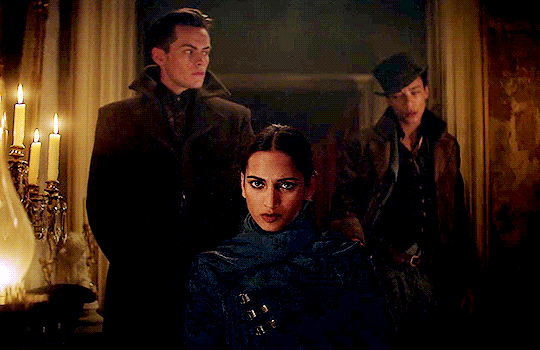
Jesper, Inej, and Kaz are all allowed to be flawed, to have serious conflicts with one another, and yet to love each other. They feel like a found family in the best of ways. Kaz is the perfect selfish rogue; he’s a much more successfully executed Byronic hero than the Darkling, actually. Inej is heroic and her faith is not mocked, yet she too is flawed and her choices are not always entirely justified, but instead left to the audience to ponder (like killing the girl), which is a more mature writing choice that I appreciated.
Jesper is charming, has a heart of gold despite being a murderer and on the surface fairly greedy, and MILO THE EMOTIONAL SUPPORT GOAT WAS THE BEST THING EVER. I also liked Jesper’s fling with Dima but I felt it could be better used rather than merely establishing his sexuality, like if Jesper and Dima had seen each other one more time or something had come of their tryst for the plot/themes/development of Jesper.
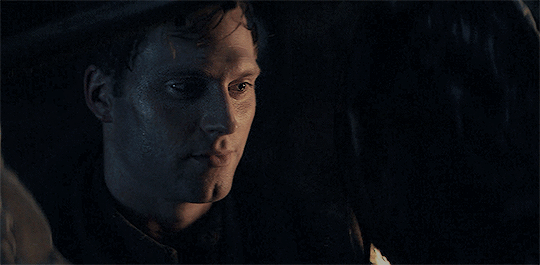
Nina and Matthias’s backstory being in the first season, instead of in flashbacks, really works because it automatically erases any discomfort of the implications of Nina having falsely accused Matthias that the books start with. We know Nina, we know Matthias, we know their motivations, backgrounds, and why they feel the way we do. It’ll be easy for the audience to root for them without a lot of unnecessary hate springing from misunderstanding Nina (since she’s my favorite). Matthias’s arc was also really strongly executed and satisfyingly tragic. Their plotline was a bit unfortunately disconnected from the rest of the story, but Danielle Gallagan and Callahan Skogman have absolutely sizzling chemistry so I found myself looking forward to their scenes instead of feeling distracted. Also? It’s nice seeing a woman with Nina’s body type as a romantic and powerful character.
Hamliet Likes Malina Now
Insofar as the trilogy storyline goes, the best change the show made was Mal. He still is the same character from the books, but much more likable. The pining was... a lot (too much in episode 4, I felt) but Malina is a ship I actually enjoyed in the show while I NOTP’d it in the books. Mal has complexity and layers to his motivations (somewhat) and a likable if awkward charm. Archie Renaux was fantastic.
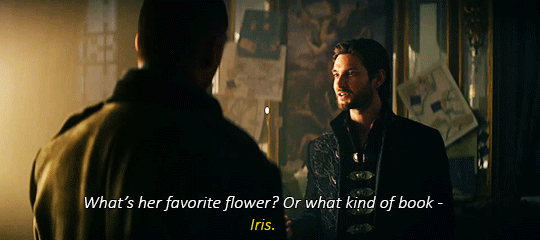
Ben Barnes is the perfect Aleksandr Kirigan, and 15 year old me, who had the biggest of big crushes on Ben Barnes (first celebrity crush over a decade ago lol), was pretty damn happy lol. He’s magnificantly acted--sympathetic and terrifying, sincerely caring and yet villainous in moments. Story-wise, I think it was smart to reveal his name earlier on than in the books, because it helps with the humanization especially in a visual medium like film. Luda was a fitting (if heartbreaking) backstory, but it is also hard for me to stomach knowing what the endgame of his character is. Like... I get the X-men fallacy thing, but I hope the show gives more kindness to his character than the books did, yet I’m afraid to hold my breath. Just saying that if you employ save the cat, if you directly say you added this part (Luda) to make the character more likable (as the director did) please do not punish the audience for feeling what you intended.
I also liked the change that made Alina half-Shu. It adds well to her arc and fits with her character, actually giving her motivations (she kinda just wants to be ordinary in a lot of ways) a much more interesting foundation than in the books. Also it’s nice not to have another knock-off Daenerys (looking to you Celaena and book!Alina). Jessie Mei Li does a good job playing Alina’s insecurities and emotions, but...
Narrative: The Ehhhhhhh
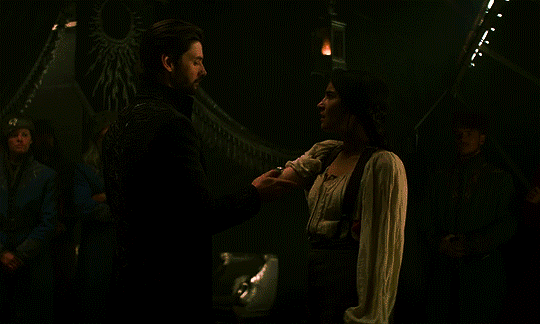
Alina the Lamp
Sigh. Here we go. Alina has little consistent characterization. She’s almost always passive when we see her, yet she apparently punches an officer for calling her a name and this seems to be normal for her, but it doesn’t fit at all with what we know about her thus far. Contradictions are a part of humanity, but it’s never given any focus, so it comes across as inconsistent instead of a flaw or repression.
I have no idea what Alina wants, beside that she wants to be with Mal, which is fine except I have no idea what the basis of their bond is. Even with like, other childhood friends to lovers like Ren/Nora in RWBY or Eren/Mikasa in SnK, there’s an inciting moment, a reason, that we learn very early on in their story to show us what draws them together. Alina and Mal just don’t have that. There’s the meadow/running away thing, but they were already so close, and why? Why, exactly? What brought them together? The term “bullies” is thrown around but it isn’t ever explored and it needed to be this season. If I have to deal with intense pining for so many episodes at least give me a foundation for their devotion. You need to put this in the beginning, in the first season. You just do.
A “lamp” character is a common metaphor to describe a bad character: essentially, you could replace the character with a lamp and nothing changes. Considering Alina’s gift is light, it’s a funnily apt metaphor, but it really does apply. Her choices just don’t... matter. She could be a special lamp everyone is fighting over and almost nothing would change. The ironic thing is that everyone treating her like a fancy lamp is exactly the conflict, but it’s never delved into. We’re never shown that Alina is more than a lamp. She never has to struggle because her choices are made for her and information is gifted to her when she needs it. Not making choices protects Alina from consequences and the story gives her little incentive to change that; in fact, things tend to turn out better when she doesn’t make choices (magic stags will arrive).
Like... let’s look at a few occasions when Alina almost or does make choices. For example, she chooses to (it seems) sleep with Kirigan, but then there’s a convenient knock at the door and Bhagra arrives with key information that changes Alina’s mind instantly despite the fact that Bhagra’s been pretty terrible to her. If you want to write a woman realizing she’s been duped by a cruel man, show her discovering it instead of having the man’s abusive mother tell her when she had absolutely no such suspicions beforehand. There’s no emotional weight there because Alina doesn’t struggle.
When she is actually allowed to carry out a bad choice, the consequences are handwaved away instead of built into a challenge for her. Like... Alina got her friends killed. More than once. I’m not saying she’s entirely to blame for these but could we show her reacting to it? Feeling any sort of grief? She never mentions Raisa or Alexei after they’re gone, just Mal, and I’m... okay. They were there because of you. Aren’t you feeling anything? Aren’t you sad? The only time Alina brings up her friends’ deaths is to tell Kirigan he killed her friends when they were only there because she burned the maps. She yells at Kirigan for “never” giving her a choice, but she almost never makes any, so why would he? Alina has the gall to lecture Genya about choices, but she herself almost never has to make any.
Which brings me to another complaint in general: Alina’s lack of care for everyone around her when they’re not Mal, even if they care for her. Marie dies because of her (absolutely not her fault of course) but as far as we know she never even learns about Marie. She certainly doesn’t ever ask about her or Nadia. Alina seems apathetic at best to people, certainly not compassionate or kind.
The frustrating thing is that there is potential here. Like, it actually makes a lot of psychological sense for an orphan who has grown up losing to be reluctant to care for people outside of her orbit and that she would struggle to believe she can have any say in her destiny (ie make choices). It’s also interesting that a girl who feels like an outsider views others outside her. But the show never offers examines Alina’s psychology with any depth; it simply tells us she’s compassionate when she is demonstrably not, it tells us she makes decisions when it takes magical intervention to do so. It’s a missed opportunity. This does not change between episodes 1 and 8, despite the episodes’ parallel structures and scenes, which unintentionally reinforces that Alina had little real development.
Inej and ironically Jesper and Kaz embody the concept of “mercy” far better and with far more complexity than Alina does. The Crows have reactions to the loss of people who even betray them (Arken, etc), learn, and course-correct (or don’t) when they are even loosely involved in having strangers die. They’re good characters because they change and learn and have their choices matter. When they kill we see them wrestle with it and what this means even if they are accustomed to doing so. Jesper can’t kill in front of a child. Kaz wonders what his killings do to Inej’s idea of him.
Narrative: The Mixed Bag
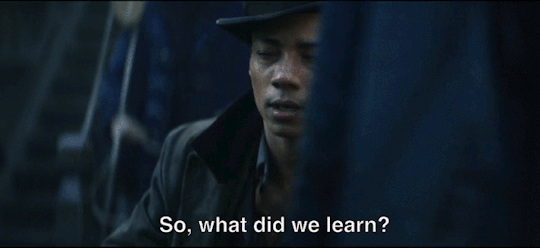
Tropes, Themes, Telling vs. Showing
So the show’s themes in the Alina storyline are a mess, as they are in the trilogy too. Tropes are a very valuable way to show your audience what you’re trying to say. They’re utilized worldwide because they resonate with people and we know what to expect from them. The Crows' storyline shows us what it wants us to learn.
Preaching tells, and unfortunately, the trilogy relies on telling/preaching against fornicationBad Boys. It’s your right to write any trope or trample any trope you want--your story--but you should at least understand what/why you are doing so. The author clearly knows enough about Jungian shadows and dark/light yin/yang symbolism to use it in the story, but then just handwaves it away as “I don’t like this” but never does so in a narratively effective way: addressing the appeal in the first place. If you really wanna deconstruct a trope, you gotta empathize with the core of the reason these tropes appeal to people (it allays deep fears that we are ourselves unlovable, through loving another person despite how beastly they can be), and address this instead of ignoring it. Show us a better way through the Fold of your story. Don’t just go around it and ignore the issue.
The trilogy offers highly simplistic themes at best--bad boy bad and good boy good, which is fine-ish for kid lit but less fine for adult complexity, which the show (more so than the books) seems to try to push despite not actually having much of it.
Alina and Mal are intended to be good, we’re told they are, but I’m not sure why beyond just that we’re told so. Alina claims the stag chose her, but in the show it’s never explained why at all. Unlike with Kaz, Inej, Jesper, and hell even Matthias and Nina, we don’t see Alina or Mal’s complex choices and internal wrestling.
Like, Inej’s half-episode where she almost killed the guy they needed was far more character exploration than Alina has the entire show, to say nothing of Inej’s later killing which not only makes her leaps and bounds more interesting, but ironically cements her as a far more compelling and yes, likable, heroine than Alina. We see Inej’s emotional and moral conflict. We can relate to her. We see Kaz struggling with his selfishness and regrets, with his understanding of himself through his interactions with and observations of Inej, Alina, the Darkling, Arken, and Jesper.
We don’t explore what makes Mal or Alina good and what makes them bad. We don’t know what Alina discovers about herself, what her power means for her. We are told they are good, we are told she knows her power is hers, but never shown what this means or what this costs them/her. Their opportunities to be good are handed to them (the stag, Bhagra) instead of given to them as a challenge in which they risk things, in which doing good or making a merciful choice costs them. Alina gets to preach about choices without ever making any; Inej risks going back to the Menagerie to trust Kaz. Her choices risk. They cost. They matter and direct her storyline and her arc, and those of the people around her.
Production Stuff:
The Good:
The production overall is quite excellent. The costumes, pacing, acting, and cinematography (for example, one of the earliest scenes between the Darkling and Alina has Alina with her back to the light, face covered in his shadow, while the Darkling’s face is light up by her light even if he stands in the shadows) are top-notch. The soundtrack as well is incredible and emphasizes the scenes playing. The actors have great chemistry together, friend chemistry and romantic when necessary (Mal and Alina, the Darkling and Alina, Kaz and Inej, Nina and Matthias, David and Genya, etc.) All are perfectly cast.
The Uncomfortable Technicalities Hamliet Wants to Bitch About:
The only characters from fantasy!Europe having any trace of an accent reminiscent of said fantasy country's real-world equivalent are antagonists like Druskelle (Scandinavia) and Pekka (Ireland). When the heroes mostly have British accents despite being from fantasy Russia and Holland, it is certainly A Choice to have the Irish accent emphasized. The actor is British by the way, so I presume he purposely put on an Irish accent. I'm sure no one even considered the potential implications of this but it is A Look nonetheless.
The Anachronisms Hamliet Has a Pet Peeve About:
The worldbuilding is compelling, but the only blight on the worldbuilding within the story itself (ignoring context) was that there are some anachronisms that took me out of the story, particularly in the first episode where “would you like to share with the class” and “saved by the horn” are both used. Both are modern-day idioms in English that just don’t fit, especially the latter. The last episode uses “the friends we made along the way.” There are other modern idioms as well.
IT’S STARKOVA and Other Pet Peeves Around the Russian Portrayal
Russian names are not hard, and Russian naming systems are very, very easy to learn. I could have waved “Starkov” not being “Starkova,” “Nazyalensky” not being “Nazyalenskaya,” and “Safin” not being “Safina” as an American interpretation (since in America, the names do not femininize). However, “Mozorova” as a man is unfathomable and suggests to me the author just doesn’t understand how names work, which is a bit... uh okay considering a simple google search gets you to understand Russian names. They aren’t hard. I cannot understand why the show did not fix this. It is so simple to fix and would be a major way to help the story’s overall... caricature of Russia.
Speaking of that... Ravka is supposedly Russian-based, but it is more accurately based on the stereotypes of what Americans think of Russia. Amerussia? Russica? Not great.
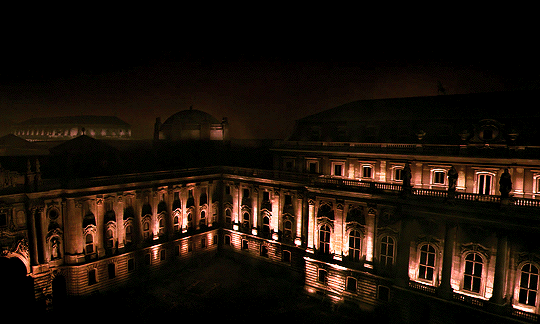
The royals are exactly what Americans think of the Romanovs, right down to the “greasy” “spiritual advisor” who is clearly Rasputin and which ignores the Romanov history, very real tragedy, and the reason Rasputin was present in the court. The religion with all its saints is a vapid reflection of Russian Orthodoxy. The military portrayal with its lotteries and brutality and war is how the US views the Russian military. The emphasis on orphans, constant starvation, classification, and children being ripped from their homes to serve the government is a classic US understanding of USSR communism right down to the USSR having weapons of destruction the rest of the world fears (Grisha). Not trying to defend the Soviet Union here at all, but it is simplistic and reductive and probably done unconsciously but still ehhhh.
However, I’m not Russian. I just studied Russian literature. I’ve seen very little by way of discussion of this topic online, but what I do see from Russian people has been mixed--some mind, some don’t. The reality is that I actually don’t really mind this because it’s fantasy, though I see why some do. I'm not like CANCEL THIS. So why am I talking about this beyond just having a pet peeve?
Well, because it is a valid critique, and because it doesn’t occur in a vacuum. The Grishaverse is heralded as an almost paragon for woke Young Adult literature, which underlines itself what so frustrates me about how literary circles discuss issues of diversity and culture. Such praise, while ignoring its quasi-caricature of Russia, reflects a very ethnocentric (specifically American) understanding of culture, appropriation, and representation. All stories are products of their culture to various extents, but it bothers me on principle what the lit community reacts (and overreacts sometimes?) to and what people give a pass to. The answer to what the community reacts to and what it gives a pass always pivots on how palatable the appropriation is to American understandings and sensibilities. There’s nuance here as well, though.
I'm not cancelling the story or thinking it should be harshly attacked for this, but it is something that can be discussed and imo should be far more often--but with the nuance it begs, instead of black/white. But that’s a tall ask.
#s&b#hamliet reviews#shadow and bone#six of crows#kanej#jesper fahey#kaz brekker#inej ghafa#alina starkov#malyen oretsev#the darkling#darklina#malina#aleksander kirigan#netflix shadow and bone#s&b review
274 notes
·
View notes
Text
John Watson and The Abominable Bride
After reading this brilliant analysis and the following interesting discussion about gay subtext in Conan Doyle’s Sherlock Holmes, also commented by @thepersianslipper, I felt inspired to explore a bit further what Mofftiss might have made of Holmes’ and Watson’s relationship in the episode The Abominable Bride - TAB - of BBC Sherlock. TAB, which is supposed to mainly take place in 1895 (albeit inside Sherlock’s head), seems to be focused on Mofftiss’ take on the Victorian original of their work. In particular I wanted to explore the role of John Watson in this episode, which I suspect is a commentary on ACD himself. I interpret TAB’s Watson as ACD’s alter ego in this context, since he’s (supposedly) the storyteller. What kind of stories did ACD actually write, what did he put in, what did he leave out and what did he leave obvious only to people approaching the story with ‘queer’ glasses?
TAB raises some questions that I think aren’t found - or at least aren’t that very obvious - in the rest of the show. There are similarities, of course, but I think TAB is a rather different display, and not only because the story seems to be re-told from a 19th century perspective. TAB has lines that seem to refer directly to literary criticism of ACD’s work, rather than being meaningful elements of the plot line in Mofftiss’ adaptation. It’s all disguised as Watson talking about his published works in The Strand, which was actually ACD’s own publisher IRL. But I think that’s a bit different from modern John publishing entries on his own blog, which is not Mofftiss’ principal channel of publishing, even if they’ve made it accessible to all viewers who have Internet.
So how is Watson depicted in TAB? For one thing, he starts out clean-shaven by the time he first meets Holmes, but as soon as we see him married, he wears a mustache. Not like the dull, ill-fitting one from TEH, but a ‘virile’, Victorian version which is far more similar to ACD’s own mustache (X).
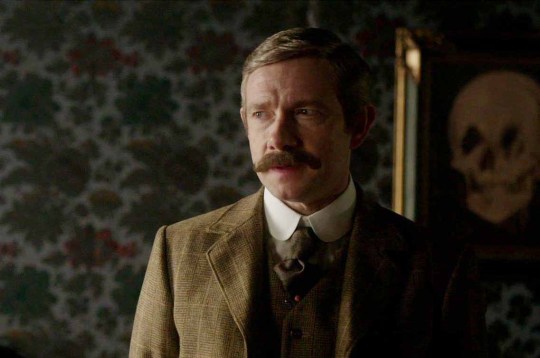
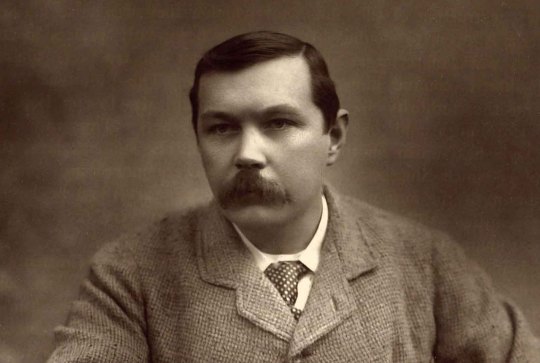
But in TAB Watson also appears like a man attempting (but failing) to keep up a ‘manly’ facade by trying to lord over the other sex. His treatment of his wife is one example, which gets more contradicted and opposed by Mary the more the episode advances. Watson is rather condescending when she asks him - as opposed to her behaviour in canon - not to leave her behind, and he responds by basically telling her to go back to the kitchen.
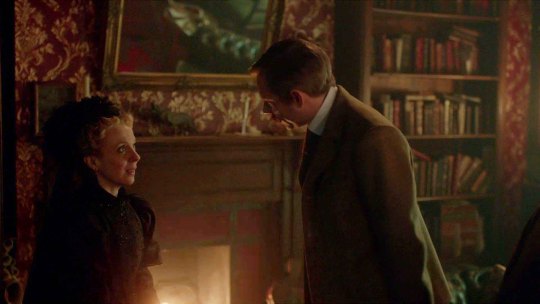
MRS WATSON: And am I just to sit here? WATSON: Not at all, my dear. We’ll be hungry later!
Then he runs off with Holmes as usual.
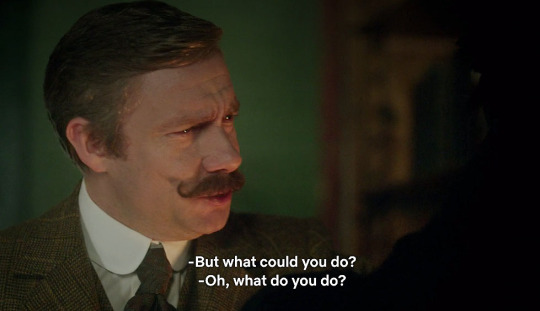
Watson wonders why on earth Mary is trying to be a client. But in ACD’s stories, Watson’s wife has only a role to play as long as she is a client. After that, she’s reduced to some kind of silent support-base for Watson’s relationship with Holmes, who repeatedly encourages her husband to rather spend time with his dear friend Holmes than with her. Not very convincing if you ask me. ;)
An example from FIVE: “My wife was on a visit to her mother’s, and for a few days I was a dweller once more in my old quarters at Baker Street”. (At this point ACD conveniently ‘forgets’ that Mary Morstan is an orphan in the earlier story The Sign of Four (SIGN)). And why would her journey mean that her husband automatically should sleep at 221 B anyway? ;))
Another example from The Naval Treaty (NAVA): “My wife agreed with me that not a moment should be lost in laying the matter before him, and so within an hour of breakfast-time I found myself back once more in the old rooms in Baker Street.” This was supposedly in the month that immediately followed on their wedding. Hmm...
ACD literally wrote Mary out of the story by marrying her with Watson, rather than doing the opposite, which would have seemed more logical to me. Why create a character whose interesting story we’re allowed to know, only to push her out of sight as soon as she marries one of the protagonists? To me this seems almost too wasteful, even with Victorian (sexist) standards of depicting women. Even when Mary is dead and gone, Watson’s ‘wife’ is still referred to every now and then, but without offering her even a name. Which leaves it pretty obvious, in my opinion, that this wife is merely a facade - but apparently important as such.
Mary in both HLV, TAB and TST seems reluctant to accept this role (except when Sherlock reveals her as a facade by projecting her picture on a real, empty facade), but in TLD ghost!Mary encourages John to go and solve crimes together with Sherlock: “make him wear the hat”. In other words, John and Sherlock are allowed to spend most of their lives together, but only as long as the ghost of Watson’s wife still hangs over them as a heterosexual alibi, and as long as the Work can be used as an excuse. This comes directly from Doyle, as far as I can see.
In the case of TAB’s Mrs Hudson, she has very few lines; all she does is serving breakfast or tea, and the literary critic’s perspective is even spelled out by ACD Watson: “Well, within the narrative, that is – broadly speaking – your function“. Which is later, when the character refuses to talk at all, backed up by Holmes: “I fear she’s branched into literary criticism by means of satire. It is a distressing trend in the modern landlady”. And to be honest, I can’t think of many lines from Mrs Hudson in canon, in spite of her being Holmes’ landlady for a very long time. She must certainly have seen a lot of ‘these gentlemen’. :) In the rest of BBC Sherlock she plays a far more important part, to the point that I believe even her more off-hand remarks are actually significant to the story.
Watson’s housemaid in TAB is also treated badly: he rants at her, and when she observes (probably to really rub it in for the audience) that his marriage doesn’t seem to be very happy and fulfilling, and then asks why she is never mentioned in the stories, he orders her out of the room, and then immediately goes running after Holmes.
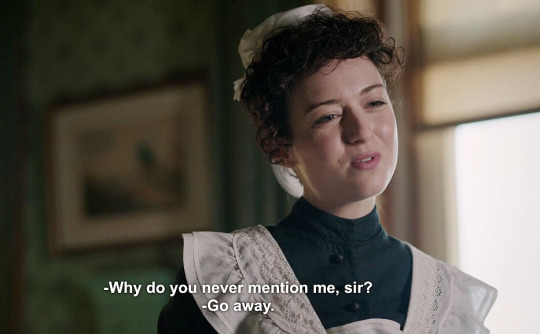
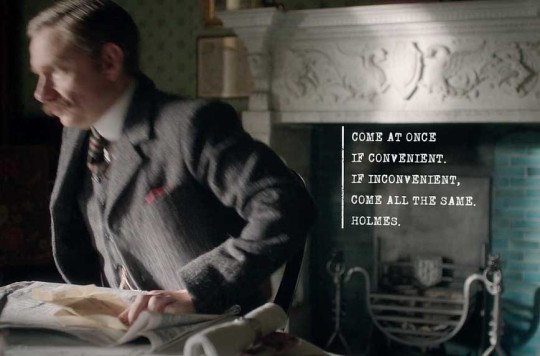
(Isn’t it interesting, by the way, that the greenish tiles in Watson’s fireplace are so similar to those at modern 221B? ;) This scene is confirmed to happen inside Sherlock’s head, but very similar tiles also appear in the drug den of HLV...)
As for [Molly] Hooper (a John mirror, I believe, created specifically for BBC Sherlock), there’s the morgue scene where her appearance is very similar to Watson’s; the colour scheme, the clothes and even the ACD-style mustache is there.

And that’s exactly when Watson starts talking about a possible ‘secret twin’ in the murder case.

But if Watson and Hooper are metaphorical twins here, one of them is the one who otherwise in the show has made it quite obvious that they’re in love with Sherlock Holmes, while the other one tries (but hopelessly fails) to hide this fact. I also think it’s significant that for the first time in BBC Sherlock, Molly Hooper is recognised as a doctor (a pathologist) in charge of the morgue, rather than any kind of assistant working at a lab. But then Watson ‘outs’ Hooper as a woman, taking his hat off for her while still being dismissive. Is it his own bisexuality he’s dismissing?
Just one more reflection upon Watson and the women in TAB. Lady Carmichael, whose husband Eustace is mocking her and looking down on her, is called Louisa. ACD’s first wife was also named Louisa. They married after knowing each other only for a few months, which is even less than the time between John meeting Mary and their marriage in BBC Sherlock. Louisa died of consumption (chronic tuberculosis) at the age of 49. Watson states in the morgue scene of TAB that Emelia Ricoletti, the ’Abominable Bride’, was already dying from consumption when she committed suicide.
Ghosts are a recurring theme in TAB (as well as in TLD). Holmes makes it clear that they don’t exist - ”save those we make for ourselves” - and that ’the abominable bride’ as a vengeful ghost is created by trickery.
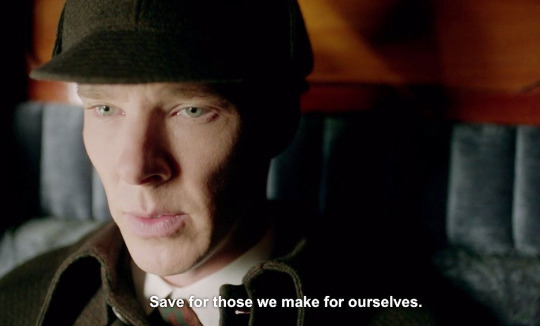
But Watson in TAB is also more superstitious than John ever gives us reason to think he is in the modern show. And according to several sources, ACD was a fervent believer in the spiritual world and life after death (X, X, X).
Speaking of vengeful ghosts, I think one of the names Holmes suggests for this case, before Watson decides to call it “The Abominable Bride”, is quite interesting: The League of Furies. The furies in Greek mythology were vengeful goddesses. One of their explicit purposes was punishing oath breakers and marital infidelity - they were jealousy personified. It’s hard to see the logics in TAB of this cult of women seeking revenge by murder, for crimes that are not actually specified. Or committing suicide merely to prove a point. Vengeance seems more apt in the case of the victims of Charles Augustus Milverton’s blackmail (CHAS), but in TAB the crimes aren’t revealed. All they tell us about Emelia’s husband, for example, is that he “had his way with her”. But since this is all happening inside Sherlock’s mind palace, I think it makes far more sense (as someone has suggested - was it @ebaeschnbliah? @raggedyblue? Sorry for my bad memory) that what we’re actually seeing is Sherlock beating himself over the head with metaphors for emotions. It’s not about the actual women of the show, but rather about the fury of neglected emotions. The vengeful ‘furies’ are over him and John and their mirrors, for having been repressed for such a long time.
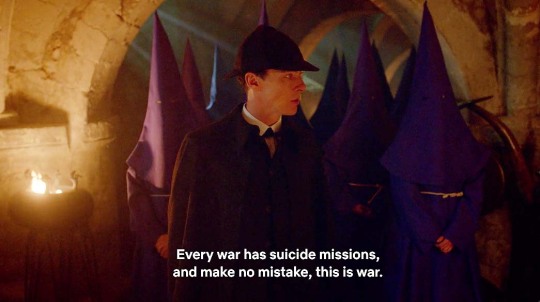
Another interesting topic in TAB is the five orange pips that Eustace Carmichael receives, apparently from the women of the cult (who bear pointy hoods like the KKK). Eustace is terrified by the threat and believes that his old sins are coming back to him, while still trying to keep up a brave facade, outwardly blaming his wife for being hysteric. But soon he’s stabbed to death. While the five ‘pips’ also appears as ‘Greenwich pips’ already in TGG (which some brilliant people have pointed out resembles a five-act play, where S5 might be the unresolved final ‘pip’), these real pips are from ACD’s The Five Orange Pips (FIVE).
Doyle’s story is about a rather unpleasant uncle of Holmes’ client, who was a racist and member of the KKK in the States. Following his escape back to Europe after the civil war, the remnants of the Klan seek him out and threaten him with orange pips as a signal, and later kills him. When the client visits Holmes and Watson, the following dialogue occurs, which is exactly the same as the conversation between Louisa Carmichael and Holmes in TAB:
“I have come for advice.” “That is easily got.” “And help.” “That is not always so easy.”
The same threat and killing happens also to the client’s father and eventually to the client himself (who is named John, by the way). Holmes figures out who the culprits are, but by then their sailing ship has already left London. The story ends with Holmes and Watson being reached by the news that parts of the wrecked ship have been found drifting in the Atlantic, but the destiny of the crew is unknown. Un unsolved case by ACD that is still waiting for its solution in Series 5?
Transcripts from Ariane De Vere (X). Screen-caps (partly) from here.
@sarahthecoat @gosherlocked
101 notes
·
View notes
Text
Doctor Who: What Each Actor Brings to the Role of the Master
https://ift.tt/3mNUlMa
Sometimes you’ve just got to look at the general vibe of 2020 (the furnace bit in Toy Story 3 but half the toys are drinking lighter fluid) and decide to write something positive. On my way to nursery, another dad was telling me how he found Sacha Dhawan’s performance as the Master in Doctor Who a high point of the last series, so inspired by that, let’s celebrate what was good about each actor to play the role on television. If nothing else, it’ll probably be good for my mental health and give someone a chance to type ‘Of course Roger Delgado was the original and best’ in context, so hopefully that’ll make them happy too.
Roger Delgado (or to give him his full name ‘Roger Caesar Marius Bernard de Delgado Torres Castillo Roberto’ – which is Spanish for ‘Of course Roger Delgado was the original and best’) originated the role, playing the character regularly from 1971 until his death in 1973.
‘Terror of the Autons’, his first story, has the Master hypnotically influence people and murder them in a variety of nasty, convoluted ways. The character developed as an inversion of Jon Pertwee’s Third Doctor. Pertwee insisted on a few “moments of charm” sprinkled into the scripts, but his Doctor was also curt, loud, arrogant, and antagonistic. Delgado’s Master, on the other hand, was charming, pleasant and witty.
Delgado’s performance reminds me of a Christopher Nolan film: there’s a sense of confidence, almost elegance present that makes something potentially ridiculous feel contextually sensible. Of course the Master is allying himself with someone who will inevitably betray him; he has a series of incredibly realistic face masks he can generate seemingly at will, and of course he’s decided to pose as a legal official for no obvious reason. This is his great skill: the poise to carry off the ridiculous and terrible as perfectly reasonable.
The Master’s Masks
The character returned in 1976’s ‘The Deadly Assassin’. With Delgado having passed away and writer/Script Editor Robert Holmes planning on leaving Doctor Who, he wrote a Master who could easily be written out by the next production team: a skeletal creature, born of pragmatism, with ambitious plans and nothing to hide his sadism. This Master would destroy Gallifrey and hundreds of other planets to cheat Death, whom he evokes in appearance.
The Master was planned to be the villain in Holmes’ final story, ‘The Talons of Weng-Chieng’, directly placing the character into the territory of Jack the Ripper. This version of the character was accordingly vicious, and what Peter Pratt brings out is bitterness. Working from behind a mask, Pratt’s voice and body language are at their best when the Master is operating from the shadows, the strained whispers of a dying man bent on vengeance. The Relationship is no longer playful, it’s sadistic.
Geoffrey Beevers’s Master in ‘The Keeper of Traken’is in another emaciated transitional state, playing a role taken by an original character in earlier drafts. Beevers’ performance is reminiscent of Ian McDiarmid as Grandad Palpatine: clearly untrustworthy yet simultaneously immensely persuasive.
The Master becomes a punchline
Anthony Ainley – who takes over from Beevers in ‘The Keeper of Traken’- clearly had a lot of fun playing the Master. Fans of computer game Destiny of the Doctors may recall how infectious Ainley’s enthusiasm for the role could be. Visually, his Master is reminiscent of Delgado, but he rarely has the same poise. Bluntly, there’s less dignity to the character. The chuckling, smooth façade is masking desperation, not anger. The quirks and regular mistakes Delgado’s Master made are now writ large in writing and performance. There is more than a hint of Alan Partridge as the Master scrapes through a series of ill-conceived low-stakes plans, somehow bouncing back. He becomes a punchline, an understudy, before again being reduced to mere survival. On a purely camp level, Ainley is great and memorably arch, but his incarnation unravels before us without explicit logic.
Read more
TV
Sacha Dhawan’s biggest pre-Doctor Who roles
By Louisa Mellor
TV
Doctor Who Series 12 Ending Explained
By Chris Farnell
Eric Roberts is much simpler to deal with. For most of the 1996 TV Movie, his Master is written as an Americanised Roger Delgado and then, towards the end, we have both the camp and desperation of Ainley. Roberts may not be the most invested actor to play the part but he’s still having fun with it, playing the character bigger and broader than he’d ever been (and, we thought in 1996, as big as he’d ever get).
Before we talk about John Simm, Derek Jacobi is the final of the mayfly Masters. As Russell T. Davies observes on the DVD commentary for ‘Utopia’, Jacobi’s eyes convey so much of the character in his short screen time. Now we have Delgado and Ainley’s confidence, but the anger and sadism of Pratt’s Master is to the fore. It’s a handy and concise amalgamation of a lot of the character that leaves you wanting more. Jacobi also has a tiny, thespy outburst of ham to complement what’s come directly before and what’s about to arrive.
Mirroring the Doctor
John Simm’s Master, aka Harold Saxon, is not like Delgado’s in characterisation, but is also written as a comment on the current Doctor. This Master is, rather than an inversion, The Doctor as “The Big Bad” of the series in a post-Buffy TV landscape and so, given the Tenth Doctor, he’s fast-talking, quippy, mercurial (He sells himself as a messenger from the heavens at one point) and dangerous. The difference is that the Master embraces the latter.
Because these Doctor Who episodes were event television in 2007, we have the Master delivering on huge, complex plans that destroy millions of lives: beyond Delgado-level competence with beyond Ainley-level camp. Russell T. Davies is a big fan of tonal dissonance so we get the violence against women that Holmes hinted at with the Jack the Ripper connection, but in the same episode the Master prances along to The Scissor Sisters.
It’s important to make the distinction with Simm’s performance between personal taste and realisation of the scripts the actor is given. In terms of the latter, Simm delivers a big, cartoonish performance with a nasty edge because that’s what he’s been asked to do. Having carved a reputation with serious roles in Life on Mars, The Lakes and Cracker, Simm played against reputation. The character is written and performed big enough to make Eric Roberts seem the build-up rather than peak of the crescendo, managing to out-Tennant Tennant while baiting slash fiction writers.
A warped friendship
Continuing to explore The Relationship further results in Michelle Gomez’ Missy coming in with a finale-scale plan, with the reveal that the traditionally complex scheme is actually a warped gesture of friendship.
Missy’s character development builds on aspects of her predecessor – the nods to a deeper friendship are developed, but the crucial difference is when faced with a choice between death and being shackled to the Doctor for centuries, Missy chooses the latter and Saxon chooses death. This gives Gomez more to play with than Simm and she delivers on both the mania, as you’d expect Green Wing’s Sue White to do, but also brings out more enigmatic qualities.
While the gender-flip of the character coinciding with their softening is questionable, Gomez delivers the most poised performance since Delgado’s and also has a grumpy Doctor/fun Master inversion. And as for her final scene, it’d be a brave and/or foolish showrunner to return to the character soon after that.
Thirteen episodes later and mild-mannered Agent O turned out to be the Master in ‘Spyfall’. To be fair to all involved: hardly anyone expected this. Sacha Dhawan absolutely nailed the contrasts necessary for the reveal to work. His performance continues the manic rage and glee, but he has to do a lot with dialogue like ‘It’s red because it’s drenched in the blood of our people’ – a zinger that has all the rhythm of someone dropping crockery down an escalator. Dhawan’s Master doesn’t drive the story, instead being inserted into it to fulfil and explain story beats, and so he hasn’t had as much to work with.
cnx.cmd.push(function() { cnx({ playerId: "106e33c0-3911-473c-b599-b1426db57530", }).render("0270c398a82f44f49c23c16122516796"); });
Looking back, the Master has only really settled as a character in their last three incarnations, and while Roger Delgado’s incarnation is influential it’s in small ways. In fact Delgado’s incarnation is now something of an anomaly. While the basics of the character are largely intact throughout – evil and complex schemes that involve the Doctor – the character hasn’t been convincingly debonair since 1973. Instead the character has become more intense and manic. What connects the fan favourites is they’ve been asked to play interesting contradictions – unflappable despite their failures, vicious and violent despite their clear affection – so there’s more to them the peculiar tragedy of a recurring villain who never wins.
The post Doctor Who: What Each Actor Brings to the Role of the Master appeared first on Den of Geek.
from Den of Geek https://ift.tt/2GmQVAy
0 notes
Text
Volume 4 Commentary Counter to Counter
https://rerwby.tumblr.com/post/161522494149/rwby-volume-4-commentary-play-by-play
Yes, like anyone whose opinion matters wants to hear the whiney, egotistical creator of the third rate, cliché, poorly written version of RWBY bitch about how the people who are actually talented and capable of producing a product that has more to offer than Gen RWBZed.
I’d say the whole volume was a fuck-you shot to the fans but
But you know you’ll get called out on your bullshit seeing as the ratings for Volume 4 are above Volumes 1 and 2 and the only negative things we’v e heard outside of RWDE is a couple of minor issues qand the usuqal “Yang doesn’t get enough screentme.”
And you’re not one to talk: RE:RWBY is just a giant Fuck You shot to the real RWBY and just writing in general.
I’m leaning towards believing this since Salem was one of the first things conceived for the show, so her team would follow. Makes you wonder if Miles was always gonna have his “crazy” Tyrian though or if that came later. I doubt it because I don’t believe Monty would make characters as boring as Hazel and Watts right from the start.
Gee, it’s almost as though those characters have been on screen for a total of five minutes a piece and thus not enough time to be developed and thus you are being a nitpicky douche for making judgements so earlier so you can bitch.
Yeah it’s not breaking news to say that they did the opposite of what would be a good idea. Mentioned in the commentary, but in more detail in the special features, is the fact that CRWBY had a rough start to the volume due to the new production pipeline, which continued for several episodes.
You know, the most common compliant with Oscar was he didn’t get enough screentime to develop his struggle with Ozpin and thus moving him up to Episode 4 is an improvement over the original plan of 7. Of course, it’s not breaking news for RWDE to sabatoge the show just to complain more: That’s like a third of their Modius Operande.
And at least RWBY is original: the one creative license to your name isn’t even an attempt at being original with you badly copying and pasting RWBY onto a screen with what little you do change to make it objectively worse.
Wondering how they would have fit 4 whole monsters in that fight, but I guess that’s why they ended up splitting two bad guys between teams instead.
Oh but Re:RWBY, you just said they don’t do good ideas so that should have happened!
Yeah, see what your bitching does: invalidates what little you have to say nice to show you flip flop like a limp pancake.
Just saying that I believe this. They said that Roman originally played a smaller part in Volume 1? How was this possible? Insert more villains.
And this is worth jackshit...how? is it a crack at the writers? if so, it’s even worse than normal. Is this an observation? Then this belongs under the category of “No shit, Sherlock.”
So Weiss fought a Grimm in her trailer it turns out. Idk how to feel about that. In a way it makes sense because, as we’ve seen with Winter’s summons, the Schnee summons are light versions of Grimm. It makes little sense though when you consider that the Geist inhabits inanimate things and therefore the armor isn’t a natural feature of the Grimm.
Gee, did the fact that she could summon the fucker not tip you off?
And the very commentary points out that the Geists are named after what they inhabit (AKA Petra Geist) so it seems like whatever they inhabit because a Grimm by extension.
Iunno what fatal flaw to focus on here. Is it how this makes it sound like Jaune’s god damn weapon model design was THAT important that Kerry noticed? That it implies melting Pyrrha’s armor down was a last-minute thought? That the plot hole of Pyrrha fucking disintegrating and therefore leaving no armor or cape for Jaune was made entirely because Kerry liked how a shield looked?
Hey RE;RWBY? Know what a storyboard is? Obviously not considering you would know that a storyboard is made RIGHT AFTER they basic writing and thus NOT LAST MINUTE.
So instead of losing it for a reason they just lose it for the sake of it. Cool.
Sort of how Pyrrha can’t understand what jaune was going through in volume 1.
Or how Neptuen and Sun got thrown out of the fight in Voume 2.
Or how no one noticed how old Cinder was in Volume 3.
Or any number of innumerable so-called “plot holes” that shoud have logically booted you out of here a long time ago.
The name kind of gave it away without any other hints
Not really: I never got it. I just thought it was a word for betrayal.
Wow. The people working on this show were seriously so disillusioned that they thought Pyrrha’s relationship with Jaune earned that kind of reaction. Not even gonna mention how the existence of the recording makes no sense, especially since Pyrrha signs off on it. Why would she do that on a generic fighting guide. I can’t believe how attached these people were to the Alpha Hets.
Or, you know.... IT WAS A CHARACTER THEY GOT ATTACHED TO. KIND OF LIKE THE MILLIONS OF PEOPLE WHO CRIED WHEN SHE DIED.
And why does their sexuality have anything to do with how their suffering causes pain in people capable of feeling empathy? Are you saying that people should care about people if their heterosexual? Or are you saying that they only cared about Pyrrha because she was heterosexual?
If A then you are a heterophobe and thus any you say about sexuality should be immediately disregarded. if B then that's offensive to at least Lindsay and Arryn who are LGBT and work at RT.
can’t say anything more than what’s been said on this.
Except maybe a list of what they did right and what they did wrong OBJECTIVELY like a REAL critic would do?
She seemed pretty cruel to me lol. They need to have Salem do more before they announce these kinds of intentions, because now they’ve just given us a preconceived notion and they won’t have to write it that way.
Gee, it’s almost as though Salem is the fucking BIG BAD and thus the GREATEST EVIL IN RWBY. And considering she was protecting CInder from her colleagues taunts and was gently pushing Cinder to improve, she has the motherly side as well. She has done enough: You just wanna bitch considering you cannot grasp the concept of a Big Bad.
This might be the stupidest thing I’ve ever read.
Considering this is the author of Re:RWBY and “Alpha Hets”: That’s a lie.
ANd they do this type of thing in anime all the time. It’s even a real life ocurrance so a commonplace and even factually correct is the stupdiest thing you’ve read? Guess you don’t read much then.
Wow! Joel and Burnie, two voice acting veterans who formed RT, are invested in their roles? Don’t get too shocked by actors who actually try, guys!
Well, you heard that right Miles, Kerry, Linsday, Barbara, Arryn and Vic: You all suck and you should all quit your jobs because one person is an ingrateful little shit.
Blah blah magical mystical Asia land
1. So does that mean the entirety of Avatar was “Blah blah magical Asian land”? Good to know Re;RWBY.
2. gee, I wonder who the creator of RWBY was? Oh right, Monty Oum, an Asian of four nationalities. So uh, pretty sure your the racist here.
Can you imagine if we had to see RNJR somehow not notice Qrow like twenty feet away from them? Thank god he sat in that pub across the street.
Ever heard of a cloak or disguise? Also, you’re bitching about them doing something right again.
I mean iunno that scene didn’t scream emotional to me but I also have daddy issues so
Well that explains the misgyony and bias against males. Also: we get it: you have about as much of a soul as Flowey. You don’t need to remind us.
Makes you wonder if by the time of their conception, Faunus were a thing or if Monty was just making up furry OC’s.
And we should give two shits... why?
Jfc guys went kinda overboard there. Didn’t look like 100+ when I watched it.
CRWBY: *Does hard work*
Re:RWBY: *Bitches about hard work not meeting their expectations*
Good to know this is fine: I’ll start publicly launching the reasons why you suck as a writer directly at you form now on.
That’s about what I guessed yep. Now is there a reason for it to be Neptune? To show that Weiss grew past her affection towards him? Or because it was the first person who came to mind? Who knows.
Number 1. Because it shows character development. Oh wait, I’m expecting a RWDE poster to understand good writing. Sorry, big mistake there.
I remember when capes were in Kingdom Hearts. Then they realized they were too much work so they removed them to avoid continuity errors and such. It was a smart and humble move, because the capes looked cool. I guess Tyrian’s jacket was just really that awesome though.
Any problems with Tyrian’s jacket? No? Then this is a bitch to bitch point.
Just gonna keep reminding us of that huh guys?
And you’re just gonna keep bring it up huh?
well that is a legitimately very interesting fact
And now you provide one...
Best decision they ever made, thank god. I love the idea of Miles being all modest and going “ah yes time to be mature.”
Who wants to bet they’ll ruin this soon?
The RWBY writers struggling with exposition?
There it is: Less that and more making it not sound like exposition.
And it was made known that Miles conceived one of the worst parts of the entire story. And he just copied it from a Grimm Tale.
Not gonna mention how everyone (including YOU) said Miles mad eit up on the spot and got totally contradicted?
And it’s (SHOCK) RWBY takes inspiration from Fairy Tales.
Also: I didn't know Miles wrote in the Maidens.
Isn’t this why you, like, direct your scenes? To avoid miscommunication like that?
Did he say it was bad or just shocked? Oh wait, you won’t tell us because it might contradict your bitching.
Apparently the animation crew’s passion is graphic design.
Aren’t you a fan of Studio Trigger? Wouldn't that be obvious?
Again, directing.
RWBY chibi, Camo Camp, mentoring the new writer for Red Vs Blue.
They had a lot on their plate.
Idk how to feel about this but it is kind of disturbing that Miles would be so quick to make that joke.
Wanna know what’s more disturbing? SHowing zero empathy and an absolute lack of self awareness. Wanna know what that looks like? Look in the mirror.
guessed everyone who knows of overwatch’s existence
No shit Sherlock.
That probably would have made some sense.
And I’m guessing that here they said they didn’t have time and you choose to ignore that for the sake of bitching right?
So Lancaster gets shot down completely, cool. Cool thing of a creator to do. How dare we imply Ruby and Jaune are close after all they’ve been through.
Gee, it’s almost as though a certain part of the fandom will send death threats and verbally abuse and terrorize the crew for heterosexuality.
Yeah I bet Miles loved Tyrian.
And I bet that’s an insult.
Pretty sure Sun’s torso is a tube with the new models.
Yes, that clearly rectangular shape is a cylindrical tube.
God, what is left for Qrow to reveal? We got his weapon’s forms, his Semblance, his transforming thing, what else? Tbh my bet’s on Ozpin’s cane. They planned for him to use the cane but decided against it because of their artifact bullshit.
Salem’s origins, the history of the Headmasters secrets behind Ozpin, bandits, Raven, STRQ.
And said bullshit was planned whereas the Maidens whom you’ve said nothing about wasn’t. Yeah, between your failure at writing, your failure at basic empathy, your failure at self awareness and your failure at basic fact comprehension you just spent all this time making a complete ass of yourself.
3 notes
·
View notes
Text
We’re Expecting You...To Boldly Go
[or, a fun exercise in comparing The Love Boat to Star Trek: The Next Generation]
I’ve always had a fondness for shows that aired several decades before I was born. When I was a kid, I loved the TV channel Boomerang, because it broadcasted classic cartoons like Scooby-Doo, Where Are You! and Snorks and The Jetsons. As I entered my preteen years, I graduated to live-action, checking out DVD box sets of The Facts of Life and Fantasy Island and The Love Boat from the library.
I don’t know if other people in my generation are familiar with The Love Boat—it was a television show that ran on ABC from 1977-1987. The show took place on a cruise ship, the Pacific Princess, and a typical episode would begin with the Princess leaving out of its home port of Los Angeles, proceeding to such stops as Cabo San Lucas and Puerto Vallarta before ultimately returning to Los Angeles at the end of the hour. The Love Boat’s claim to fame was its rotating roster of guest stars (with a new lineup in each episode), who were a mix of contemporary actors/celebrities (like Jim Nabors, Florence Henderson, and Sonny Bono) and old Hollywood/Broadway royalty (like Gene Kelly, Ethel Merman, and Zsa Zsa Gabor). These guest stars would provide the Pacific Princess with its passengers. There was a regular cast of characters that helped anchor (pun intended) the show—Merrill Stubing, ship’s captain; Adam “Doc” Bricker, ship’s doctor; Burl “Gopher” Smith, assistant yeoman purser; Isaac Washington, chief bartender; and Julie McCoy, cruise director. Vicki Stubing, the captain’s teenaged daughter, was added to the cast in season 3. In the final few seasons, Julie was replaced by her sister Judy, and the ship gained a photographer in Ace–full name Ashley Covington Evans. (Also, every so often, a guest star would play a member of the crew, like the gift shop manager or the chef, rather than a passenger.)
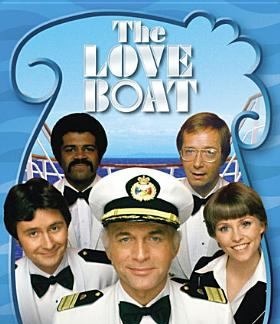
A standard episode was divided into three storylines that played out simultaneously over the course of a cruise. The vast majority of the storylines were romance-based, but there were others that consisted of family drama or old friends getting together. The regular cast members would participate in the passengers’ stories to varying degrees, sometimes being an integral part of the plot and sometimes only existing on the sidelines. The storylines would all get resolved by the time the Pacific Princess returned to Los Angeles, and the passengers would (almost always cheerfully) disembark, usually never to be seen again. Plotlines did not carry over from one week to the next, and even if a guest star returned in a later episode, chances were they would be playing a completely new character.
Although the guest cast took up the majority of the screen time, I was always more invested in the regulars, and wished we could spend more time with them—learning their backstories, exploring their dynamics with each other, and watching them actually do cruise ship work instead of pal around with the passengers. Because of The Love Boat’s near-anthology setup, not much effort was put into any sort of ongoing character development. Intense romances on the main cast’s part one week would be completely forgotten the next week, family deaths wouldn’t be brought up until it was relevant to that episode’s storyline, and new details about the crew’s past would be added as plot points, even sometimes directly contradicting a previous episode.
(The Love Boat had other issues that have less to do with my criticism of the writing and more to do with an adherence to certain flawed social practices, like how Isaac's love interests were always Black, or how single mothers were greeted with raised eyebrows, or how people of Asian or Latino/a descent were accompanied by specific musical cues–but these issues are not the point of this post so I won’t get into them at this time.)
Star Trek: The Next Generation premiered the year The Love Boat went off the air—1987—and ran until 1994. I only got into Star Trek in college, and TNG was my first series as it was easily available on BBC America. Although it had been several years since I had watched The Love Boat on a regular basis, one day a connection was made in my mind, and it occurred to me that there were a great deal of parallels to be drawn between a certain rom-com/drama at sea and a certain sci-fi adventure in space. I kept this observation in my head for years, but now that I have a blog (and because I have been rewatching a few episodes of The Love Boat in the past few weeks), I have decided to write out all of these parallels in detail.

First: the basic setup. The main cast is the crew of a ship, but we only really meet a handful of the hundreds of actual crew members needed to run the ship. In The Love Boat, for example, we don’t see the engineering crew, but the Pacific Princess must certainly have one in order to function, and although we do sometimes see Captain Stubing hanging out on the bridge, we don’t even know the name of the first officer. As I mentioned above, occasionally a guest star would play a crew member in an episode, acting as if they’d been there the whole time, but we would never see them again after that one appearance. A few times, one of the main cast would interact with an extra portraying a crew member—Julie would ask a steward to escort a guest somewhere, or Isaac would ask a waitress to carry a tray of drinks over to someone—but for the most part it seemed like our regulars did all the work on the ship. When Captain Stubing would have pre-cruise preparation meetings, it was always just with the main cast, who were not necessarily the people a real cruise ship captain would be meeting with right before sailing. (Take Gopher—he was only the assistant yeoman purser, and yet he was in all those meetings while the chief yeoman purser was not. Actually, I’m pretty sure the chief purser never made an appearance in the entire ten years the show was on the air. I believe Gopher got a blink-and-you’ll-miss-it promotion to chief purser in later seasons, but he was definitely assistant-purser-with-odd-authority at first.)
In TNG, the same sort of thing would happen. CMO Beverly Crusher claimed to have other doctors working under her, but beyond a Vulcan named Selar who showed up in one episode of the show, we didn’t see them. Missions that seemed suited to one of the science departments of the Enterprise, like xenobiology or astrophysics, would be carried out by senior staff members—also known as the main cast. There were a few more named recurring crew member characters on TNG than on The Love Boat, like Miles O’Brien and Reg Barclay, but for the most part our bridge crew did pretty much everything. And while it makes sense on TNG for the senior staff to interact with each other a great deal, they should also be interacting with their respective teams—and yet we don’t really see that happen. Geordi and Data are more likely to address an engineering problem on their own in a given episode than Geordi and the actual engineering staff, and we don’t really see Worf running his security teams through drills or target practice. On The Love Boat, Doc and Isaac for some reason are often seen checking passengers in at boarding, when that should not be in their job description at all and what we should see is Gopher supervising his staff doing those duties.
Both shows are more plot driven rather than character driven. Our main cast members in both shows are meant to serve as respondents to new situations brought aboard their respective ships, rather than personalities to be interrogated in depth. The main cast is defined enough that the audience can have a favorite character and know how a Picard story differs from a Worf story, or a Gopher story from a Julie story. But all in all the draw and focus of TNG was more “What is the crisis on the planet of the week?” or “What common ground can be found with this new alien species?” or “What commentary on the human condition can be extrapolated from this shipwide invasion?” rather than, say, Beverly’s mental and emotional state as a widow working under the man who ordered her husband to his death or the nuances of Troi and Riker’s no-longer-dating-but-still-sort-of-in-love friendship. Meanwhile, The Love Boat was preoccupied with “What sort of antics will this week’s cast of characters bring on board?”. Doc joked regularly about his multiple ex-wives, but we never got a character study about how Doc seemed to like falling in love more than maintaining a romantic relationship in the long term.
The Love Boat’s regular cast were pretty much the same season to season—Gopher was accident-prone and quick to goof around, Doc maintained his Lothario status, Captain Stubing was quick to both rebuke and advise. I didn’t really watch the post-Julie seasons, so maybe some character developments happened that I missed, but generally the passengers were the ones transformed by their time on the ship, not the crew. TNG characters did have a bit more of an arc than the crew of the Pacific Princess—Data got more in touch with his humanity and Picard relaxed more around his personnel, for instance. But that didn’t apply to all the characters—I’m hard-pressed to think of any sizeable developments in Geordi’s character beyond being promoted to Chief Engineer. Speaking of that promotion, once the show found its footing and everyone had the positions they would come to be known for—Geordi as Chief Engineer rather than the helmsman he was early on, Worf as Chief Tactical Officer post-death of Tasha Yar—nothing really changed for our main characters’ situations. The status quo was strictly enforced despite events unfolding that would have naturally led to transitions. After “Best of Both Worlds,” it would have made sense for Riker to ascend to his own command, but instead he stayed first officer season after season. Worf resigned his commission to fight in the Klingon Civil War, but once that was over, he strolled back onto the bridge without even any extra paperwork.
That aversion to long-term change was in keeping with the episodic nature of both shows. Nowadays, we’re used to the need to keep up with each season’s developments in a television show and watch every episode lest we miss some important revelation. In the case of TNG and The Love Boat, for the most part, you can drop a new viewer into any given episode and they’ll be fine. The stories are largely self-contained, and everything is pretty much resolved at the end of the hour.
This TNG/TLB comparison, however, is not resolved just yet...stay tuned for part 2!
0 notes